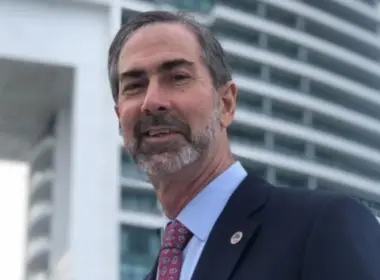Perspectives from the World Strategic Forum
Each year hundreds of global leaders assemble at the Biltmore Hotel in Coral Gables to discuss issues of vital importance at the World Strategic Forum. The event is organized by the International Economic Forum of the Americas and the Adam Smith Center for Economic Freedom at Florida International University. This year the theme was “Mastering the New Economy.” From one of the key sessions, “The Alternative Investment Landscape”, we present excerpts from the panel, moderated by Global Miami Publisher Richard Roffman, edited for brevity.

What are the key issues we are facing?
Leveille: The future is about agriculture… how can we make sure that we know where our food is coming from? If the pandemic taught us anything, it was about supply chain… if you recall, the farmer was once the richest person in town, but nowadays is the poorest. [The question is] how we can invest in the farm and also in the production [of food] and create assurances for all of us so that we know where our food is coming from?
Blumberg: We need all kinds of energy. Every single type should be on the table and be promoted because many people will have no energy… Fortunately there is help coming from the tech world, bringing productivity… [large corporations] have an incredibly strong need for productivity enhancement.
Smallwood: As we talk about alternative investments, gold in my mind is the original critical mineral, the one uniform measure of value, universally accepted around the world. At the World Gold Council, we’re basically bringing gold ownership into the 21st century. We’re basically incorporating blockchain into gold ownership, where instead of having to actually move the gold, you can move digital tokens that have a direct connection back to physical gold stored in a vault.
Sparks: We develop technology that more or less mimics human behavior in a working environment. The reason this is important in AI is because we think that as productivity is increased, we’re able to pursue more humanistic endeavors. We all know that time is our most valuable commodity, so the number one thing that we do at Pixel Lime is try to increase productivity for our clients, so that they have more time to pursue other things.
How are people looking at AI for the future?
Leveille: “Something that’s coming out from this standpoint is [enhancing] real world assets, where you’re capturing information about energy policy and water policy, which are the two biggest [challenges] for farms, and about regenerative agriculture and how much we can produce… better information will allow for better investment in agriculture… if we start using technologies such as blockchain, AI, drones, sensors, all of those things put together, you will have data that you can use…
Smallwood: Embracing this level of information that will come all the way from the field, where the farmers are actually producing the crops, and from the mines, where the miners are actually producing the minerals [will enable] you as a consumer, you as an investor, to fully understand the costs and benefits of that product you’re consuming.
What about investments for the future?
Smallwood: I think the foundation of every investment portfolio should be some hard assets that are that are going be immune. They’re all going to suffer from volatility, there’s always going to be fluctuations in terms of what someone’s willing to pay for food, for real estate, for metals, you’re always going to have that. [But] you have to have a sort of foundation thesis that there’s going to be material that is going to have a growing need by society. Blumberg: The United States of America is the most important market of all, for almost every startup company that I deal with…. I’m [also] very big on Latin America. I think that there are enormous opportunities in this Western Hemisphere… People think it’s the Chinese century. They are wrong. It’s the Western Hemisphere century. Between Canada, the U.S., and Latin America, you have all the resources you need. You have the minerals, you have the industry, you have the capital markets, the new technology, and you have the rule of law. I would urge you to put most of your [investments] here. Diversification is fine, but the major market is here.












